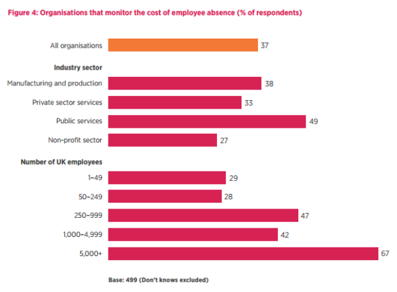KBzine: the original kitchen and bathroom industry e-news - since 2002
22nd December 2020
We strongly recommend viewing KBzine full size in your web browser. Click our masthead above to visit our website version.
One third of employers say more staff are going into work despite being ill
 Nearly a third of employers have reported an increase in people coming to work while they are ill, according to the annual Chartered Institute of Personnel & Development / Simplyhealth Absence Management Survey.
Nearly a third of employers have reported an increase in people coming to work while they are ill, according to the annual Chartered Institute of Personnel & Development / Simplyhealth Absence Management Survey.
The survey of nearly 600 employers finds that 31% have seen an increase in so-called 'presenteeism' in the last 12 months. It also shows that presenteeism is more likely to have increased where there is a culture in which working long hours is seen to be the norm, and where operational demands take precedence over employee wellbeing.
Employers that have noticed an increase in presenteeism, are nearly twice as likely as those that haven't, to report an increase in stress-related absence, and more than twice as likely to report an increase in mental health problems amongst its staff. However, despite this, nearly three-fifths (56%) of organisations that have reported an increase in presenteeism haven't taken any steps in order to discourage it.
The found that the problem of absence and presenteeism is particularly acute in the public sector, where pressure is mounting on employees to deliver services in the face of austerity cuts. The research also reveals that while there is little change in overall levels of absence (up from 6.6 days per employee per year in 2014 to 6.9 days in the 2015 survey), the public sector has seen a bigger increase, from 7.9 days to 8.7 days. However, this level of public sector absence is still noticeably lower than the figures the CIPD recorded before the recession.
"This is the fifth year in a row in which 30% or more of employers have reported an increase in employees coming into work when they are ill," reports Ben Willmott, head of public policy at the CIPD, the professional body for human resources and people development. "It's a real concern that the problem of presenteeism is persisting, as we might have expected it to drop during the economic recovery as people tend to feel more secure in their jobs.
"The problem may well be a hangover from the recession but we need to address the issue of presenteeism head-on. The message to businesses is clear: if you want your workforce to work well, you have to take steps to keep them well and this means putting employee health above operational demands."
The CIPD believes that more organisations should be developing employee wellbeing strategies in order to promote good health and combat presenteeism in the workplace. There should be a clear focus on values and organisational culture, quality of leadership and management, as well as early access to good quality occupational health and rehabilitation support.
A key emphasis should be on training line managers to equip them with the skills they need to manage people in a way that gets the best out of them, whilst supporting their wellbeing.
Corinne Williams, head of HR at Simplyhealth, comments: "It's interesting to see how much of a problem presenteeism still is, but also how little is being done about it. It's key that organisations look at their culture, the behaviours it may create and the impact this may have on stress levels, as well as overall employee health.
"Organisations should actively discourage presenteeism as part of a wider and carefully-considered wellbeing strategy, as well as exploring the root causes of this trend. It's important for employers to have wellbeing benefits and services in place that both encourage employees to look after their health and provide support when they need it."
Further highlights of the survey include:
* Stress-related absence: Two-fifths (41%) of all organisations reported that stress-related absence has increased, rising to half (51%) of organisations in the public sector. Workload remains the most common cause of stress, followed by non-work relationships / family, management style and relationships at work. Just under three-fifths of organisations (56%) are taking steps to identify and reduce stress in the workplace.
* Illegitimate absence: The report found an increase in the number of organisations reporting illegitimate absence as one of the most common causes of long-term absence. It was the most common cause of long-term absence for 6% of non-manual workers in 2015 (2014: 0%), and among the top 5 causes for 14% of non-manual workers (2014: 3%).
* Causes of absence: Minor illness remains the most common cause of short-term absence, followed by musculoskeletal injuries, back pain and stress. The most common causes of long-term absence are acute medical conditions, stress, musculoskeletal injuries, mental ill health and back pain.
This report is the CIPD's 16th national survey of absence management trends, policy and practice. The analysis is based on replies from 578 organisations across the UK in reference to 1.5 million employees and was conducted in June and July 2015.The report is available to download at:
www.cipd.co.uk / www.simplyhealth.co.uk
16th October 2015








